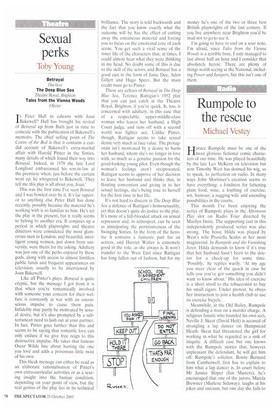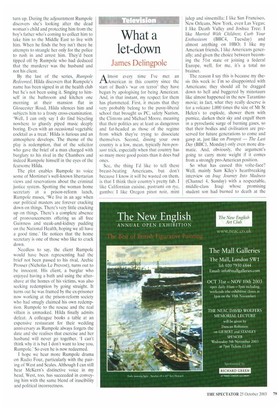Rumpole to the rescue
Michael Vestey
Horace Rumpole must be one of the most glorious fictional comic characters of our time. He was played beautifully by the late Leo McKern on television but now Timothy West has donned his wig, so to speak, to perfection on radio. In many ways John Mortimer's creation seems to have everything: a fondness for fattening plain food, wine, a loathing of exercise, wit, humour, a nagging wife and unending possibilities in the courts.
This month I've been enjoying the series of Rumpole plays in the Afternoon Play slot on Radio Four directed by Marilyn Imrie. The supporting cast in this independently produced series was also strong. The bossy Hilda was played by West's wife Prunella Scales at her most magisterial. In Rumpole and the Vanishing Juror, Hilda demands to know if it's true that her husband hasn't been to the doctor for a check-up for some time. 'Possibly,' he replies warily. 'At my age you steer clear of the quack in case he tells you you've got something you didn't want to know about.' His idea of exercise is a short stroll to the tobacconist to buy his small cigars. Under protest, he obeys her instruction to join a health club to use its exercise bicycle.
Meanwhile, at the Old Bailey, Rumpole is defending a man on a murder charge. A religious fanatic who founded his own sect, Neville J. Skeat (David Holt) is accused of strangling a lap dancer on Hampstead Heath. Skeat had threatened the girl for working in what he regarded as a sink of iniquity. A difficult case but one knows with the Rumpole stories that, however unpleasant the defendant, he will get him off. Rumpole's solicitor. Bonny Bernard from Camberwell, first has to explain to him what a lap dancer is. In court before Mr Justice Sloper (Ian Masters), he's encouraged that one of the jurors, Marcia Brewster (Marlene Sidaway), laughs at his jokes and sarcasm, but one day she fails to turn up. During the adjournment Rumpole discovers she's looking after the dead woman's child and protecting him from the boy's father who's coming to collect him to take him to the Middle East to live with him. When he finds the boy isn't there he attempts to strangle her only for the police to rush in and arrest him. They'd been tipped off by Rumpole who had deduced that the murderer was the husband and not his client.
By the last of the series, Rumpole Redeemed, Hilda discovers that Rumpole's name has been signed in at the health club but he's not been using it. Singing to himself in the bathroom and kitchen one morning at their mansion flat in Gloucester Road, Hilda silences him and subjects him to a frosty cross-examination. 'Well, I can only say I do find bicycling nowhere to ghastly piped music deeply boring. Even with an occasional vegetable cocktail as a treat.' Hilda is furious and an atmosphere develops. The theme of the play is redemption, that of the solicitor who gave the brief of a man charged with burglary to his rival in the Chambers and indeed Rumpole himself in the eyes of the fearsome Hilda.
The plot enables Rumpole to voice some of Mortimer's well-known libertarian views and reservations about the criminal justice system. Spotting the woman home secretary at a prison-reform lunch, Rumpole muses, 'We live in an age when our political masters are forever cracking down on things. There's very little cracking up on things. There's a complete absence of pronouncements offering us all free Guinness and steak-and-kidney pudding on the National Health, hoping we all have a good time.' He notices that the home secretary is one of those who like to crack down.
Needless to say, the client Rumpole would have been representing had the brief not been passed to his rival, Archie Prosser (Nicholas Le Prevost), turns out to be innocent. His client, a burglar who enjoyed having a bath and using the aftershave at the homes of his victims, was also seeking redemption by going straight. It turns out he was framed by the ex-prisoner now working at the prison-reform society who had smugly claimed his own redemption. Rumpole to the rescue and the real villain is unmasked. Hilda finally admits defeat. A colleague books a table at an expensive restaurant for their wedding anniversary as Rumpole always forgets the date and she realises that exercise and her husband will never go together. 'I can't think why it is but I don't want to lose you, Rumpole.' So even he is now redeemed.
I hope we hear more Rumpole drama on Radio Four, particularly with the pairing of West and Scales. Although I can still hear McKern's distinctive voice in my head, West, too, has succeeded in conveying him with the same blend of irascibility and political incorrectness.



































































































 Previous page
Previous page